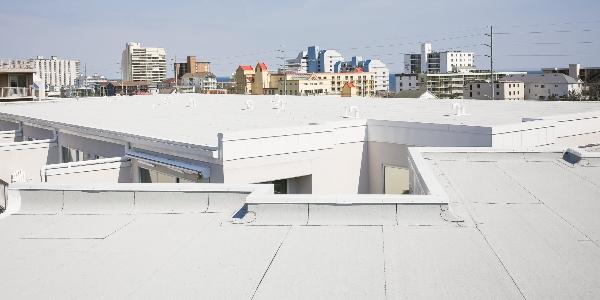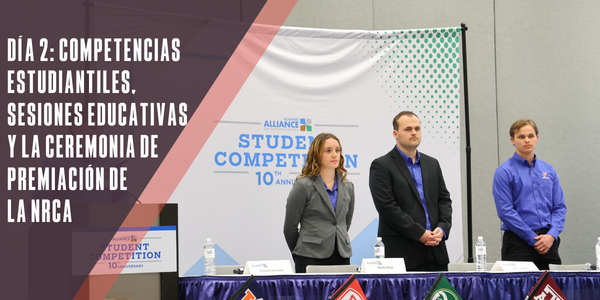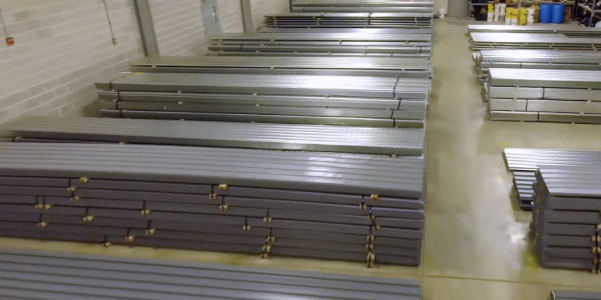Low-slope roof applications: Do you know your options?

By Polyglass U.S.A., Inc.
Explore the designs and benefits of single- and multi-ply roofing membranes for low-slope roof applications.
Low-slope roofs are defined as roofs with a pitch of less than 3:12 and require waterproofing and specific system considerations to ensure water does not buildup and cause damage over time. The most common systems used in low-slope construction are single-ply or multi-ply. This article discusses the differences between the systems and common challenges with low-slope applications.
Single-ply roofing systems for low-slope roofs
A single-ply roofing system consists of a principal roof covering, comprised of a single-layer flexible thermostat or a thermoplastic membrane rolled over the roof’s surface and then welded together. The three main types of membranes that single-ply roofing systems use are:
- Thermoplastic Polyolefin (TPO) – This membrane is a lightweight membrane that’s the most economical option; however, its stiffness is lower than standard PP grades, and its performance decreases at elevated temperatures.
- Ethylene Propylene Diene Monomer (EPDM) – EPDM consists of a black surface that fares well in cold climates, melting snow and gaining heat when necessary. It’s not compatible, though, with mineral and synthetic di-ester lubricants, and hydrocarbon fuels and solvents. It also has poor flame resistance.
- Polyvinyl Chloride (PVC) – PVC is highly reflective and can lower energy costs in warmer climates. It does come with maximum temperature scores for the material, the greatest being 140°F.
What challenges come with single-ply roofing systems?
While single-ply roofing systems are an excellent option for low-slope roofs, they can cause complications due to their materials. Improper installation and poor maintenance can also affect the material’s build and durability. If left untreated, this can lead to blistering and ridges of lap areas, ponding and water collection, shrinkage, leakage, punctures, wind damage and blow-offs.
Multi-ply roofing systems for low-slope roofs
Multi-ply roofing systems are another common type of low-slope roof. They offer several layers of defense, unlike single-ply membranes. For example, modified bitumen membranes have a stable thickness throughout their life, provided they’re installed correctly, while single-ply membranes lose thickness due to weathering.
Built-up roof membranes and modified bitumen membranes are common roofing materials used on low-sloped roofs.
Built-Up Roof (BUR) membranes
A BUR roof system is also known as a tar and gravel roof. It’s created using alternating layers of bitumen and reinforcing fabrics, then covered with a gravel top to create the finished membrane. The multiple layers provide robust protection and insulation.
BUR membranes are particularly advantageous for flat or low-slope roofing systems. Some of its benefits include:
- Multi-layer protection and water resistance.
- Exceptional thermal performance.
- Resistance to heat conduction between the exterior and interior of a building.
- Fire and uplift resistance.
Despite their design and benefits, BUR systems do come with their challenges. Installing BUR systems can be expensive, and they may develop roof splits if they’re not well anchored. BUR membranes also don’t fare well in extremely hot or cold weather conditions. The hot asphalt used in their application can pose a potential health risk to contractors and installation teams.
Modified Bitumen roofing membranes
Modified bitumen is made up of asphalt roofing sheets that have been altered with rubber or plastic. Modified bitumen roofs are similar to their structural predecessor, the BUR system, as both are installed in multiple plies. However, where modified bitumen roofs and BUR roofing systems differ is in modified bitumen’s additions to the asphalt.
Modified bitumen is created by adding polymers to the asphalt in combination with either fiberglass or polyester reinforcement to form an impenetrable roof membrane.
Compared to traditional asphalt BUR systems, modified bitumen provides stronger protection against weatherproofing and better durability. The membrane is extremely flexible, resistant to tearing, easy to repair, and can withstand a wide range of temperatures without being affected.
Modified Bitumen roof assemblies and products at Polyglass
No matter your roofing requirements, you can find the materials you need at Polyglass. Polyglass USA, Inc specializes in modified bitumen roof assemblies. We offer a variety of products that use multiple application methods.
Modified Bitumen APP roofing membranes
Polyglass’ Atactic Polypropylene (APP) modified asphalt roofing membranes are created with durable construction and produced with high-quality plastomeric compounds, allowing for long-term weathering performance.
Our APP membranes can be heat-welded or self-adhered and are offered as cap sheets and base/interply sheets to serve as part of a warranted multi-ply system. We offer APP products like APP Heat-Welded membranes, Self-Adhered APP membranes and other materials like base, felt and synthetic membranes.
Modified Bitumen SBS membranes
Our Styrene-Butadiene-Styrene (SBS) modified asphalt roofing membranes are reinforced with polyester and/or fiberglass mat, offering superior flexibility, superb tensile strength and dimensional stability. Polyglass’ SBS modified bitumen membranes are meant to be part of a multi-ply roof system.
SBS products we offer at Polyglass include Self-Adhering Elastomeric SBS roofing membranes and SBS Heat-Welded membranes.
What are self-adhered modified bitumen membranes?
Self-adhered (SA) modified bitumen roofing systems offer a safe and speedy alternative to traditional installation methods. When installed correctly, self-adhered modified bitumen roofing systems can provide the protection of systems applied with hot asphalt or cold adhesive at a fraction of the time and labor, without the potential safety hazards.
The SA membranes we offer at Polyglass are designed to provide a cleaner application, improve application speed and remove the need for torches, hot asphalt or bonding adhesives on site. This is especially useful for sites with limited access provided for special installation equipment or in cases where using a torch, or hot asphalt is not ideal or prohibited.
Polyglass is the leading manufacturer of self-adhered mod bit roofing membranes with patented ADESO® Technology.
ADESO technology transformed the modified bitumen industry by producing dual-compound self-adhered (SA) membranes using a true APP or SBS formulation on the top weathering side and an aggressive self-adhered formulation on the bottom side of the reinforcement.
ADESO Technology integrates patented features that strengthen lap sealing and enable product design with an array of customized surfaces.
Polyglass self-adhered products for low-sloped roofs include self-adhered APP and SBS membranes and base sheets, cap sheets, flashing strips and end laps for various applications and purposes.
Polyglass offers an expansive product line designed to provide excellent coverage for virtually any challenge you may have with your roofing application.
Original article source: Polyglass U.S.A. Inc.
Learn more about Polyglass in their Coffee Shop Directory or visit www.polyglass.us.





















Comments
Leave a Reply
Have an account? Login to leave a comment!
Sign In